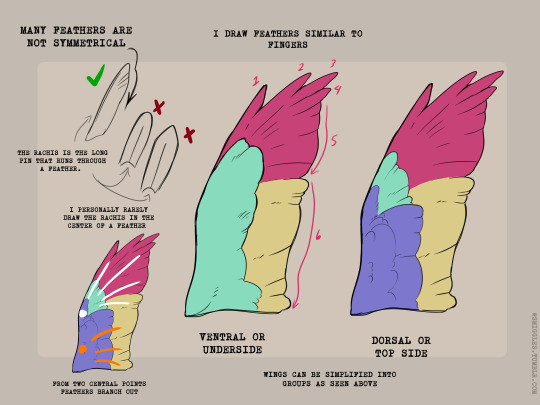Note
How do you make people fall in love with you
challenge them to a duel
347K notes
·
View notes
Text
Character idea- a medium runs an antique store and helps ghosts who haunt old objects move onto the after life. One of these ghosts haunts a 1950's rotary telephone and the medium is able to talk to her through the phone specifically but this ghost refuses to move on. Obviously they're lesbians.
Also there's a poltergeist who haunts the store and is just a pest that knocks shit over. The medium never sees the poltergeist (because ghosts can choose to allow her to see them) and so she thinks he's just an annoying pest. Turns out the poltergeist is a ghost cat just doing cat shit.
3K notes
·
View notes
Text
"low support needs disabled people are often not believed to have a disability at all and therefore struggle to get accommodations."
"high support needs disabled people's accommodations are often seen as 'too much' and therefore are not met."
"neurodivergent people's needs are often dismissed because nothing is physically wrong with them."
"physically disabled people people often cannot physically access buildings and people refuse to do anything about it."
"invisibly disabled people are seen as lazy by society."
"visibly disabled people are ostracized from society."
IT'S ALMOST LIKE THERE'S NO SUCH THING AS A SOCIALLY ACCEPTABLE DISABILITY
22K notes
·
View notes
Text
its okay to be fat btw it doesn't make you ugly or a failure or less than anyone else and if anyone has made you feel bad about it thats a reflection of them and their fatphobia and anti blackness your body is just fine the way it is theres no morality attatched to fatness you just exist in that body and theres no issue with that and you dont even need to be healthy and fat either because health doesn't dictate if you're a bad person its okay to just be fat with no apologies or excuses
2K notes
·
View notes
Text
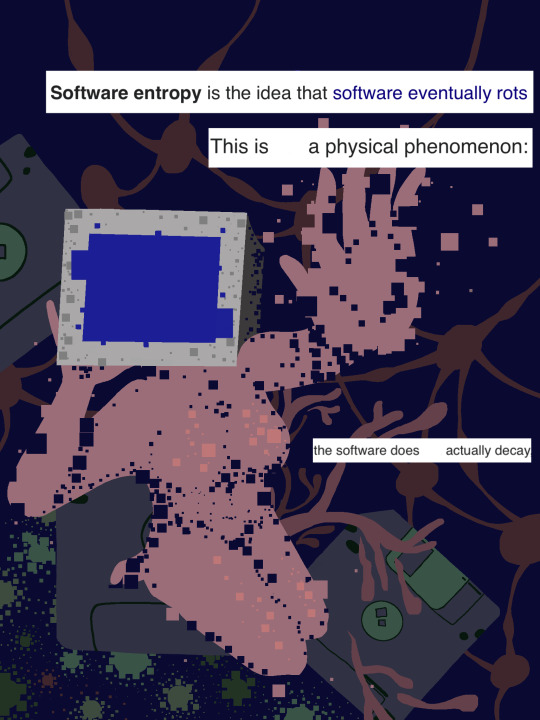

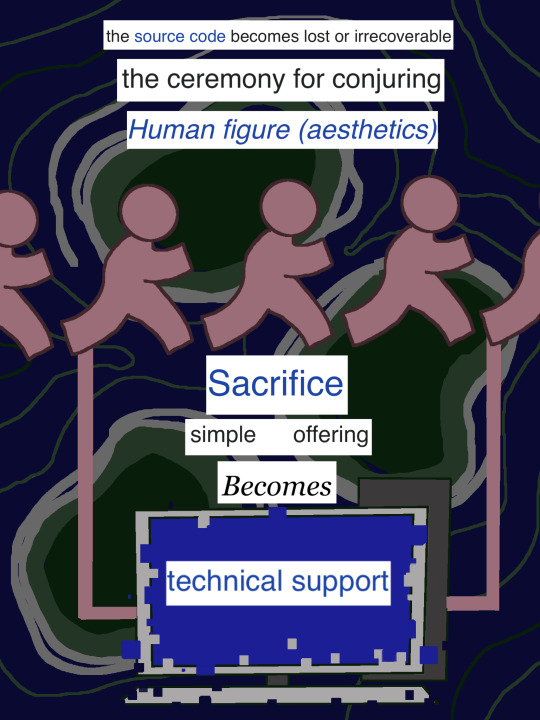
a wikipedia poem on software entropy
17K notes
·
View notes
Text

have this lil shitpost before I get back to the DTRH requests
35 notes
·
View notes
Text
the whole point of a zine is that it's cheap to produce, amateur and homemade. if you're being asked to apply to participate in a print project, it is not a zine. if the final product is being printed and bound professionally, it is not a zine. if you are being asked to enter into any kind of licensing agreement more complex than "my work can be reproduced as part of this publication" it is not a zine. nine times put of ten if the final product costs more than $5 you have left zine country. im so serious about this.
27K notes
·
View notes
Text
FAVORITEST MUTUAL ONLINE . 10000 ANGELS SING 23434325 PUPPYDOGS CUDDLED 14524 FIRST KISSES
4K notes
·
View notes
Text
FAVORITEST MUTUAL ONLINE . 10000 ANGELS SING 23434325 PUPPYDOGS CUDDLED 14524 FIRST KISSES
4K notes
·
View notes
Text
[Running Commentary] Zombies are Zombies: Cultural Relativism, Folklore, and Foreign Perspectives
She obviously started getting into media in Japan, and (from my research into Japanese media and culture), Japan’s movies about zombies are mostly comedic, since due to traditional funerary practices the idea of zombies bringing down society is ridiculous to a lot of Japanese people.
Rina: OP, this you? https://www.tofugu.com/japan/japanese-zombies/
Marika: Counterpoint: Parasite Eve. Resident Evil. The Evil Within.
Rina: Literally all the grody horror game franchises that people forget were developed and written by Japanese people because the characters have names like “Leon Kennedy” and “Sebastian Castellanos”
~ ~ ~
Based on the reception we received the last time we did one of these, the Japanese moderator team returns with another running commentary. (They’re easier to answer this way) (Several of Marika’s answers may be troll answers)
Our question today pertains to foreign perspectives on folklore—that is, how people view folklore and stories that aren’t a part of their culture. CW: for anything you’d associate with zombies and a zombie apocalypse, really.
Keep reading for necromancy, horror games, debunking the Sapir-Whorf hypothesis, Hong Kong jiangshi films, Japanese disaster prep videos, and Vietnamese idol pop...
Essentially, in my story there’s an organization who wants to end the world. They think this one woman in particular, a woman of mixed Vietnamese (irreligious, Kinh) and Japanese descent who spent her formative years in Japan, is the person to do it because she’s (for lack of a better term) a necromancer; powers are semi-normal in this world. She prefers not to use her powers overall, but when she does she mostly talks to ghosts and spirits that are giving people issues. She could technically reanimate a corpse but she wouldn’t because she feels that would be morally wrong, not to mention she couldn’t start a zombie apocalypse in the traditional sense (plague, virus, etc.) in the first place.
(Marika (M): Your local public health officials would like to assure necromancers that reviving the dead will not provoke a zombie apocalypse. This is because necromancy is a reanimation technique, and not a pathogenic vector. Assuming that the technique does not release spores, airborne viruses, gasses, or other related physical matter that can affect neighboring corpses in a similar way, there should be no issue. However, necromancers should comply with local regulations w/r to permitting and only raise the dead with the approval of the local municipality and surviving family.)
M: I think it makes sense for most people of E. Asian descent, including Japanese and Vietnamese people, to find it culturally reprehensible to reanimate the dead. I imagine the religious background of your character matters as well. What religion(s) are her family members from? How do they each regard death and the treatment of human remains? Depending on where she grew up, I’m curious on how she got opportunities to practice outside specialized settings like morgues.
M: It’s true, space in Japan is at a premium, even for the dead. You note that most of Japan cremates, but, surely, it must have occurred to you that if there aren’t that many bodies in Japan to raise…she doesn’t exactly have much opportunity to practice with her powers, does she? I yield to our Vietnamese followers on funerary customs in Vietnam, but you may want to better flesh out your world-building logic on how necromancy operates in your story (And maybe distinguish between necromancy v. channeling v. summoning v. exorcisms).
She obviously started getting into media in Japan, and (from my research into Japanese media and culture), Japan’s movies about zombies are mostly comedic, since due to traditional funerary practices the idea of zombies bringing down society is ridiculous to a lot of Japanese people.
Rina (R): OP, this you? https://www.tofugu.com/japan/japanese-zombies/
M: Counterpoint: Parasite Eve. Resident Evil. The Evil Within.
R: Literally all the grody horror game franchises that people forget were developed and written by Japanese people because the characters have names like “Leon Kennedy” and “Sebastian Castellanos”
R: And yes, the Tofugu article uses Resident Evil and those games to support its theory, with the reason that they are set in the West. But that only suggests that Japanese people consider zombies a Western thing, not that Japanese people consider zombies nonthreatening if they were to exist.
M: Same with vampires - series like Castlevania also use Western/ European settings and not “Vampires in Japan '' because vampires just aren't part of our folklore.
(M: Also, realistically, these series deal with individuals who quickly perish after their bodies are used as hosts for the pathogen in question, rather than the pathogen reanimating a corpse. Although the victims are initially alive, they soon succumb to the pathogen/ parasite and their organic matter then becomes an infectious vector for the disease. It should be noted, infecting ordinary, living humans with viruses to grant them elevated powers, is not only a major violation of consent and defies all recommendations made by the Belmont Report (in addition to a number of articles in the Hague Convention w/r to the use of WMDs) and is unlikely to be approved by any reputable university’s IRB committee. This is why the Umbrella Corporation are naughty, naughty little children, and honestly, someone should have assassinated Wesker for the grant money.)
R: wwww
From what I know Vietnam didn’t have a zombie movie until 2022.
R: Do you mean a domestically produced zombie movie? Because Vietnamese people have most certainly had access to zombie movies for a long time. The Hong Kong film Mr. Vampire (1985) was a gigantic hit in Southeast Asia; you can find a gazillion copies of this movie online with Viet subs, with people commenting on how nostalgic this movie is or how they loved it as a kid.
M: “Didn’t have a [domestic] zombie movie” is not necessarily the same thing as “Would not have made one if the opportunity had arisen.” None of us here are personifications of the Vietnamese film industry, I think it’s safe to say we couldn’t know. Correlation is not causation. It’s important to do your research thoroughly, and not use minor facts to craft a narrative based on your own assumptions.
(R: …Also, I did find a 2017 music video for “Game Over” by the Vietnamese idol Thanh Duy which features… a zombie apocalypse.)
youtube
(R: The MV has a very campy horror aesthetic and zombie backup dancers (which I love, everyone please watch this lol). But the scenes at the beginning and end where people are biting their fingers watching a threatening news report clearly establish that the zombies are considered a threat.)
So at one point, she laughs about the idea and remarks how ridiculous it is to think zombies could end the world. What I’m struggling with are other ways to show her attitude on the issue because I’d assume most non-Japanese readers wouldn’t get why she thinks like that. Are there any other ways to show why she thinks this way, especially ones that might resonate more with a Japanese reader?
R: The problem is this does not resonate in the first place. Your line of thinking is too Sapir-Whorf-adjacent. The Sapir-Whorf hypothesis, otherwise known as linguistic relativity theory, claims that language shapes cognition—that you can’t conceive of something if you can’t express it in your language. This is a very weak theory that you can easily bring evidence against: think of the last time you felt an emotion you had a hard time putting into words; just because you didn’t have the language for it doesn’t mean that you didn’t feel it, nor does it mean that you won’t be able to understand or recognize it if you feel it again. Similarly, it’s not a sound assumption to say that if some kind of subject matter does not exist in a culture, then people of that culture couldn't possibly conceive of it. This excerpt from linguist Laura Bailey sums it up quite well.
M: Just because ghosts may be more culturally relevant doesn’t mean that zombies (or vampires, or whatever) are nonexistent in a Japanese or Vietnamese person’s imagination when it comes to horror and disaster.
R: Really, if anything, Japanese people are much more attuned to how easily a society’s infrastructure can be destroyed by a disruptive force without adequate preparation. Japan is natural disaster central. A Japanese person would know better than anyone that if you aren’t prepared for a zombie epidemic—yeah it’s gonna be bad.
M: Earthquakes, tsunami, typhoon, floods: Japan has robust disaster infrastructure out of necessity. 防災 or bousai, meaning disaster preparedness is a common part of daily life, including drills at workplaces, schools, and community organizations. Local government and community agencies are always looking for ways to make disaster and pandemic preparedness relevant to the public.
M: Might “zombie apocalypse prep as a proxy for disaster prep” be humorous in an ironic, self-deprecating way? Sure, but it’s not like Japanese people are innately different from non-Japanese people. Rather, by being a relatively well-off country practiced at disaster preparation with more experience than most parts of the world with many different types of disasters (and the accompanying infrastructure), it likely would seem more odd to most Japanese people within Japan to not handle a zombie apocalypse rather like might one handle a combination of a WMD/ chemical disaster+pandemic+civil unrest (all of which at least some part of Japan has experienced). Enjoy this very long, slightly dry video on COVID-19 safety procedures and preparedness using the framing device of surviving a zombie apocalypse.
youtube
M: Living in Los Angeles, I’ve often experienced similar tactics. We do a fair amount of advance and rehearsed disaster prep here as well. In elementary school, the first and last days of class were always for packing and unpacking home-made disaster packs, and “zombie apocalypse” simulations have been around since I was in middle school for all kinds of drills, including active shooter drills, like the one shown in this LAT article. The line between “prepper” and “well prepared” really comes down to degree of anxiety and zeal. So, it wouldn’t be just Japanese people who might not be able to resonate with your scene. The same could be said for anyone who lives somewhere with a robust disaster prevention culture.
M: A zombie apocalypse is not “real” in the sense of being a tangible threat that the majority of the world lives in fear of waking up to (At least, for the mental health of most people, I hope so). Rather, zombie apocalypse narratives are compelling to people because of the feelings of vague, existential dread they provoke: of isolation, paranoia, dwindling resources, and a definite end to everything familiar. I encourage you to stop thinking of the way Japanese people and non-Japanese people think about vague, existential dread as incomprehensible to each other. What would you think about zombies if they actually had a chance of existing in your world? That’s probably how most Japanese people would feel about them, too.
230 notes
·
View notes
Text
I stumbled upon a website that allows you to blend any colors evenly no matter how opposite on the spectrum they are.
sharing the knowledge

very helpful art resource
427K notes
·
View notes
Text
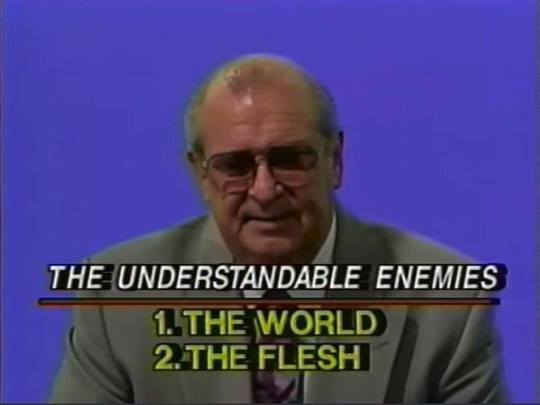
this is the hardest any single image has ever gone
56K notes
·
View notes
Text
Newer yuri fans might not realize it but Sailor Moon was a MASSIVE influence on the genre. Mostly because of these two:
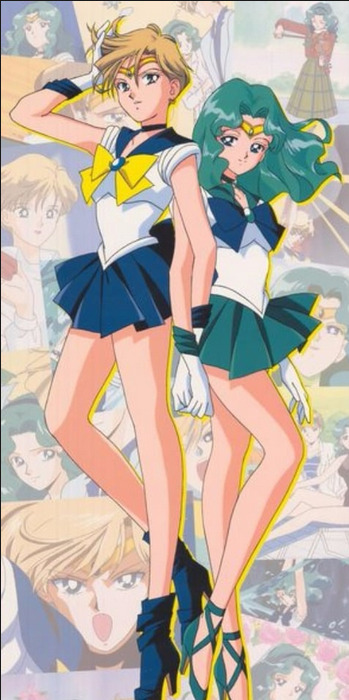
Sailor Uranus and Sailor Neptune, who were explicitly gay. They were a major part of season 3, Sailor Moon S, which was directed by Ikuhara. Who liked the characters so much he used them as inspiration for Utena and Anthy, who of course would go on to inspire many more lesbians both in anime and in western animation.
We can also thank Sailor Uranus and Sailor Neptune for giving us Cure Chocolat and Cure Macaron in Kira Kira Precure a la Mode. No really they are doing the same pose:
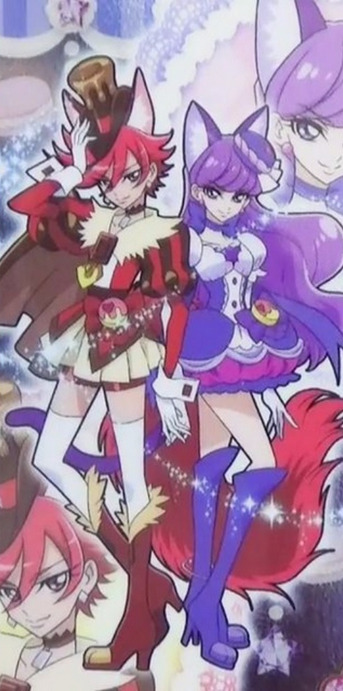
If you don't know what Precure is, it's something like Japan's version of My Little Pony, where it's aimed at six year old girls but is charming enough that it also has an adult fanbase. Anyway Cure Chocolat and Cure Macaron had a genuine love confession scene which is basically like if Rainbow Dash and Applejack outright declared their lesbian love to each other for every kindergarten aged girl in the world to see.
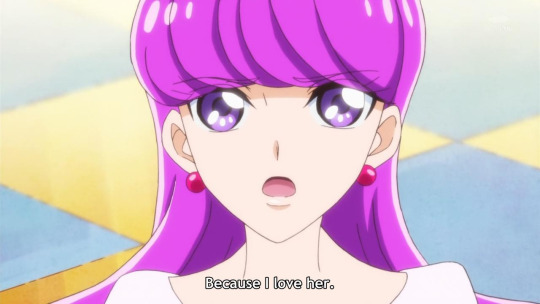
What I'm saying is Sailor Moon has been hugely influential to yuri in the past and is still hugely influential to yuri and introducing it to a new generation to this day.
554 notes
·
View notes
Text
it’s easy to forget, so I’ll remind y’all: you can make fantasy versions of anything. yes even things you might not think about. like soil types. I am thinking of fantasy soil types right now
71K notes
·
View notes
